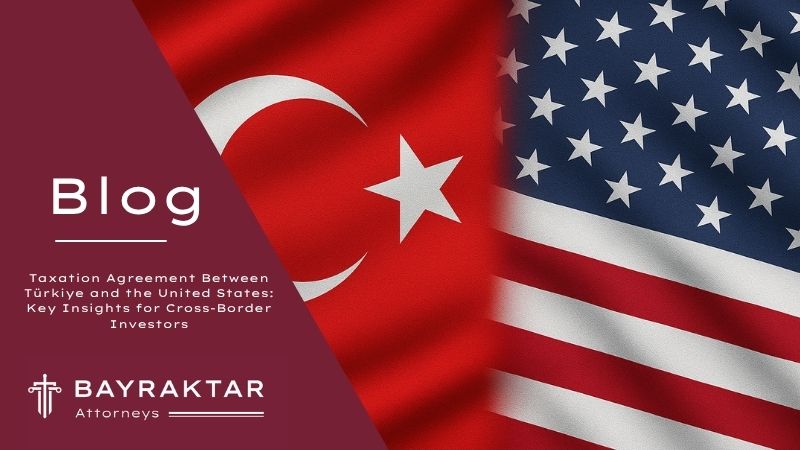
At Bayraktar Attorneys, we assist both Turkish investors managing assets in the United States and American citizens investing in Türkiye. Understanding how the Türkiye–U.S. Tax Treaty affects income from property, funds, or business activities is essential to minimize tax risks and ensure compliance in both jurisdictions.
This article outlines the structure of the taxation agreement between the two countries, explains how cross-border income is taxed, and offers strategic insights for investors seeking to manage assets across Türkiye and the U.S. efficiently.
Understanding the Türkiye–U.S. Tax Treaty
When a person or company invests abroad, one of the first questions that arises is: which country has the right to tax the income? To avoid double taxation, countries sign bilateral tax treaties. These treaties define which income is taxable where, help prevent tax evasion, and promote international trade and investment.
The Türkiye–United States Tax Treaty operates much like other double-taxation agreements. The first articles define who is covered and which taxes are included, while subsequent provisions determine residency, permanent establishments, and which country may tax specific income types.
Articles 1–5: Define scope, taxes covered, and determine “residency” and “permanent establishment.”
Articles 6–21: Govern taxation of different income types—such as real estate income, dividends, business profits, and capital gains.
Article 23: Outlines methods for eliminating double taxation, primarily through foreign tax credits.
Both Türkiye and the U.S. apply the credit method, meaning that the country of residence allows taxpayers to deduct taxes paid abroad from their domestic tax liability.
Real Estate Investments and Cross-Border Taxation
Under Article 6, income derived from real estate is taxable in the country where the property is located. This means that income from U.S. property owned by Turkish residents is subject to U.S. taxation. However, Türkiye may also tax this income, potentially creating a double-taxation risk. The treaty ensures that the taxpayer receives relief through tax credits.
Residency and Its Impact on Taxation
A taxpayer’s residency status determines how their income is taxed.
U.S. residentsare taxed on their worldwide income.
Non-residentsare taxed only on U.S.-sourced income.
For Turkish investors, residency for treaty purposes is defined under Article 4, which also includes “tie-breaker” rules to clarify dual residency cases. In practice, most Turkish investors owning property in the U.S. will be treated as non-resident aliens for U.S. tax purposes.
Taxation of Rental Income from U.S. Properties
For Turkish nationals owning rental properties in the United States, taxation depends on whether the activity is considered “effectively connected” to a U.S. trade or business.
Passive income(e.g., rent not tied to active business operations) is generally taxed at a flat 30% rate on gross income.
However, investors may elect under IRC Section 871(d)to treat the income as “effectively connected,” allowing deduction of operating expenses, such as mortgage interest, maintenance, and property taxes. This can substantially reduce taxable income.
Although the Türkiye–U.S. treaty does not explicitly mention this election, it remains available under U.S. domestic law and can significantly benefit Turkish investors.
To make this election, the investor must:
Obtain an Individual Taxpayer Identification Number (ITIN)via Form W-7.
File an annual U.S. income tax return (Form 1040-NR).
Submit Form W-8ECIto the withholding agent.
This process can be complex but often results in much lower taxation.
Turkish Tax Obligations and Elimination of Double Taxation
Under Article 23, Türkiye provides a foreign tax credit for taxes paid to the United States.
Turkish residents report worldwide income, including U.S. rental income.
The tax paid in the U.S. can be credited against the Turkish tax due, up to the amount that would have been payable in Türkiye.
Documentary proof, such as IRS payment receipts certified by the Turkish Consulate, is generally required.
This mechanism prevents double taxation and ensures that cross-border investors are not taxed twice on the same income.
Ownership Structures for U.S. Property Investments
Choosing the right ownership structure can reduce tax exposure and improve asset protection.
1. Direct Ownership
Owning U.S. property in one’s personal name is simple and cost-effective but may expose investors to:
U.S. estate taxupon death,
Gift taxon property transfers,
Loss of anonymitydue to required filings.
Still, direct ownership can provide lower capital gains rates and simpler tax reporting for short-term investors who do not require anonymity.
2. Limited Liability Company (LLC)
Holding property through an LLC offers liability protection and separation of personal assets from property-related risks. However, LLCs owned by foreign persons are usually treated as disregarded entities, meaning the foreign owner must still file a U.S. tax return.
For Turkish investors managing rental portfolios or seeking privacy, an LLC can balance protection with tax transparency.
3. Corporate Ownership
Forming a U.S. or foreign corporation to hold U.S. property provides additional protection but comes with more complex taxation:
U.S. corporationsface corporate income tax plus withholding on dividends to foreign shareholders.
Foreign corporationsare subject to branch profits tax(typically 30%) on repatriated earnings.
While corporate structures reduce personal liability, they can lead to double taxation of profits and higher compliance costs.
4. Non-Grantor Trusts
A foreign non-grantor trust can combine privacy, estate tax protection, and flexible income distribution. However, it requires careful planning and compliance with U.S. reporting requirements. When properly structured, trust-held properties are not subject to U.S. estate tax and are taxed at individual income tax rates.
How Bayraktar Attorneys Assists U.S. and Turkish Investors
Our law firm provides bilingual legal, tax, and corporate structuring services to help clients reduce double taxation risks and optimize cross-border investment outcomes.
We assist:
American citizens investing in Türkiye— including property, company shares, and funds — with asset protection, tax registration, and banking guidance.
Turkish investors owning U.S. assets— with tax compliance, ownership structuring, and treaty-based relief claims.
Clients managing international portfolios, real estate holdings, and fund transfersbetween Türkiye and the U.S.
By evaluating both U.S. and Turkish tax implications, we design structures that protect clients’ assets while maintaining full legal compliance.
📞 [email protected]
🌐 www.bayraktarattys.com
📍 Kolektif House Levent, Talatpaşa Cd. No: 5/1, 34394 Şişli, İstanbul, Türkiye




